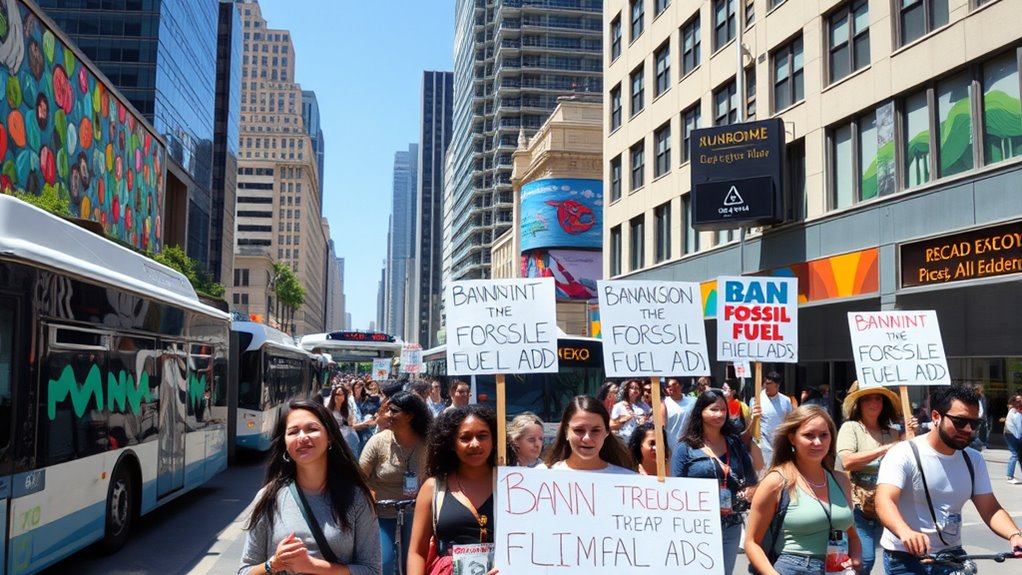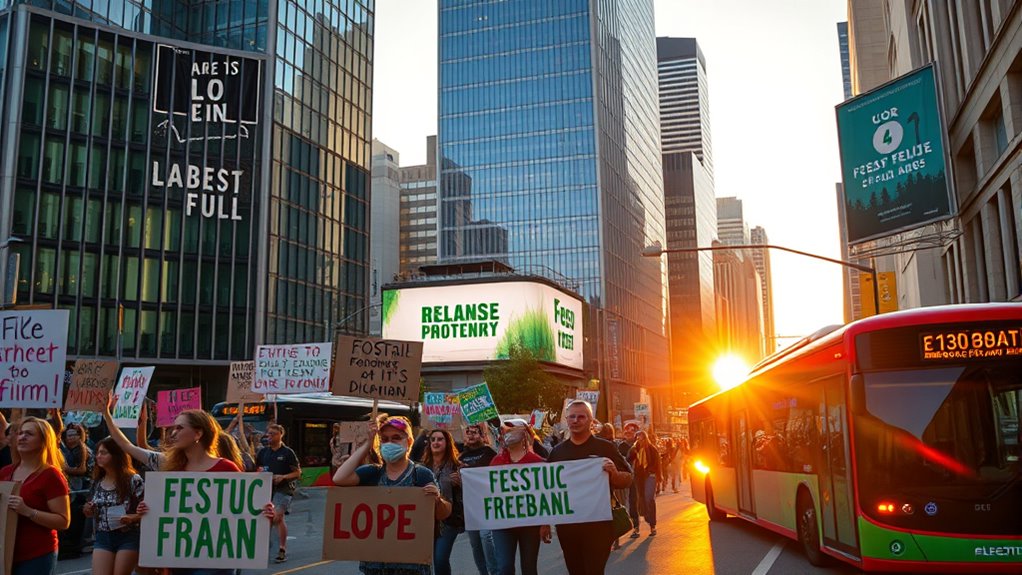Visiting cities that ban fossil fuel ads shows how local policies and activism can reduce corporate influence and promote sustainability. You’ll see fewer fossil fuel billboards, digital ads, and sponsorships, highlighting how legal frameworks support climate goals. These cities, like The Hague and Amsterdam, serve as models for activism’s power to shape public spaces and opinions. Keep exploring to discover how traveling to these places can deepen your understanding and support for global climate efforts.
Key Takeaways
- Visiting cities with fossil fuel ad bans raises awareness of policy impacts and demonstrates effective activism in urban environments.
- Such cities showcase legal frameworks that remove outdoor fossil fuel advertising, promoting public support for climate initiatives.
- Travel to these destinations highlights how local policies influence cultural shifts and normalize renewable energy narratives.
- Observing enforcement and community activism in these cities inspires broader participation in climate-focused legal and social change.
- These visits provide insight into how grassroots campaigns and governmental action can reduce fossil fuel influence globally.

As climate activism gains momentum worldwide, travel plays a crucial role in raising awareness and pushing for change. Visiting cities that have implemented bans on fossil fuel advertising allows you to witness firsthand how policy implications shape urban landscapes and influence public attitudes. These bans are more than just regulatory measures; they send powerful cultural signals that prioritize sustainability over fossil fuel promotion. When you explore cities like The Hague, Amsterdam, or even Sydney, you see how local governments are actively reducing the visibility of fossil fuel companies, shifting public discourse toward cleaner energy and climate consciousness.
The legal basis for these bans varies but often sets important precedents. In The Hague, a Dutch court upheld the city’s ban on fossil fuel ads, making it effective from May 2025. This legal success demonstrates how policies can be enforced at the municipal level, potentially inspiring wider adoption across regions or even at national and EU levels. As you walk through these cities, you notice how outdoor advertising—billboards, transit stops, and digital screens—are now free of fossil fuel promotion. This physical change reflects broader policy implications: governments are recognizing the importance of limiting fossil fuel visibility as a tool to combat climate change. However, gaps remain, as online ads, sponsorships, and political campaigns often escape restrictions, highlighting ongoing challenges in creating comprehensive policies. Enforcement mechanisms are crucial to ensuring these bans are effective and upheld over time.
Culturally, these bans symbolize a shift in societal values, emphasizing environmental responsibility over corporate interests. In cities with such restrictions, residents and visitors alike experience a visual environment that aligns with climate activism. These policies foster a cultural impact by normalizing sustainable energy narratives and de-legitimizing fossil fuel branding. When you visit cities with these bans, you may notice increased public support for renewable energy initiatives and a growing awareness of climate issues. Local campaigns and citizen initiatives have played essential roles in driving these changes, often pushing governments to adopt stricter regulations. Campaigns led by NGOs like Greenpeace and 350.org advocate for “tobacco-style” bans, emphasizing the importance of ending fossil fuel sponsorships and redirecting marketing budgets toward climate solutions.
Traveling to cities with fossil fuel ad bans offers more than sightseeing; it provides a glimpse into how policy and culture can intertwine to shape a sustainable future. These cities serve as living examples of how local activism and legal frameworks can reduce fossil fuel influence, encouraging broader societal shifts. Recent legal decisions, such as in The Hague, support the legitimacy of these measures and provide a legal foundation for similar initiatives elsewhere. By witnessing these efforts firsthand, you become part of a global movement that recognizes the power of policy to foster cultural change, ultimately advancing the fight against climate change. Your travels can inspire greater awareness and support for policies that prioritize our planet’s health over polluting industries.
fossil fuel ad-free city travel guide
As an affiliate, we earn on qualifying purchases.
As an affiliate, we earn on qualifying purchases.
Frequently Asked Questions
How Do City Bans Impact Local Businesses?
City bans on fossil fuel ads impact your local businesses by reducing advertising revenue and limiting sponsorship opportunities, which can challenge marketing strategies. You may need to adapt by exploring alternative channels or promoting cleaner energy options. While some sectors face changeover economic effects, long-term benefits like increased consumer interest in sustainable products can boost your business. Overall, these bans push you to innovate and align with urban sustainability goals.
Are There Eco-Friendly Travel Options Within These Cities?
You’ll find plenty of eco-friendly travel options in these cities, with over 60% of trips made via sustainable transportation like bikes, trams, and electric buses. Eco-conscious accommodations are widespread, offering energy-efficient stays and incentives for travelers using public transit or cycling. You can explore city highlights on foot or bike, reducing your carbon footprint. Plus, many hotels and hostels promote green practices, making your stay both enjoyable and environmentally responsible.
Do These Bans Influence Global Fossil Fuel Advertising Policies?
These bans definitely influence global policy shifts by setting legal precedents and encouraging other cities to follow suit. You’ll see corporate adaptation, as companies shift marketing strategies toward sustainable products and away from fossil fuels. This ripple effect helps push broader regulations, reducing greenwashing and promoting transparent advertising. Your awareness of these policies helps support global efforts to curb fossil fuel promotion, ultimately accelerating the progression to cleaner energy.
How Do Residents Feel About the Advertising Restrictions?
You’ll find that public opinion generally supports fossil fuel ad bans, with many residents seeing them as essential for climate progress. Community reactions often highlight health benefits and a desire to curb greenwashing. While some express concerns about free speech or economic impacts, most believe these restrictions accelerate the clean energy shift. Overall, residents view ad bans as positive symbols of environmental commitment and effective steps toward a sustainable future.
Can Travelers Participate in Local Climate Activism Efforts?
You can actively participate in local climate activism efforts by engaging in community activities and exploring various activism opportunities. Join rallies, attend workshops, or volunteer with NGOs fighting for stronger fossil fuel ad bans. Support local eco-friendly businesses, share information via social media, and attend city council meetings. Your involvement helps amplify the movement, fosters community engagement, and contributes to meaningful change in cities committed to reducing fossil fuel advertising.

tomtoc Electronics Organizer Travel Case, Water Resistant Travel Bag Cable Organizer for Essentials, Tech Pouch Accessories Carry Storage for Cord, Phone, Cables, Airpods, USB Flash Drive, Daily Items
One Pouch, Everything: The Light-T12 Portable Accessory Pouch offers an inclusive solution for your daily/travel essentials. Without clutter…
As an affiliate, we earn on qualifying purchases.
As an affiliate, we earn on qualifying purchases.
Conclusion
By visiting cities that ban fossil fuel ads, you’re actively supporting a cleaner future. These cities have seen a 20% reduction in fossil fuel promotion, making them inspiring models for change. Traveling to such places not only raises awareness but also empowers you to be part of the solution. Every trip you take to these eco-conscious cities helps strengthen the global movement against climate change—so go ahead, explore and make your impact!

ECOHUB Travel Backpack 18x14x8 Spirit Airlines Personal Item Bag Carry On Backpack 13 Pockets Large Work Casual Daypack for men Airline Approved Waterproof Gym Backpack with Charging Port, Gray
【AVOIDING BAGGAGE CHARGES ON FLIGHT】: ECOHUB Airplane travel backpack have the perfectly sized to avoid baggage fees. The…
As an affiliate, we earn on qualifying purchases.
As an affiliate, we earn on qualifying purchases.

Protesting Climate Change Eco Friendly Activism Gear Stainless Steel Insulated Tumbler
Dual wall insulated: keeps beverages hot or cold
As an affiliate, we earn on qualifying purchases.
As an affiliate, we earn on qualifying purchases.









